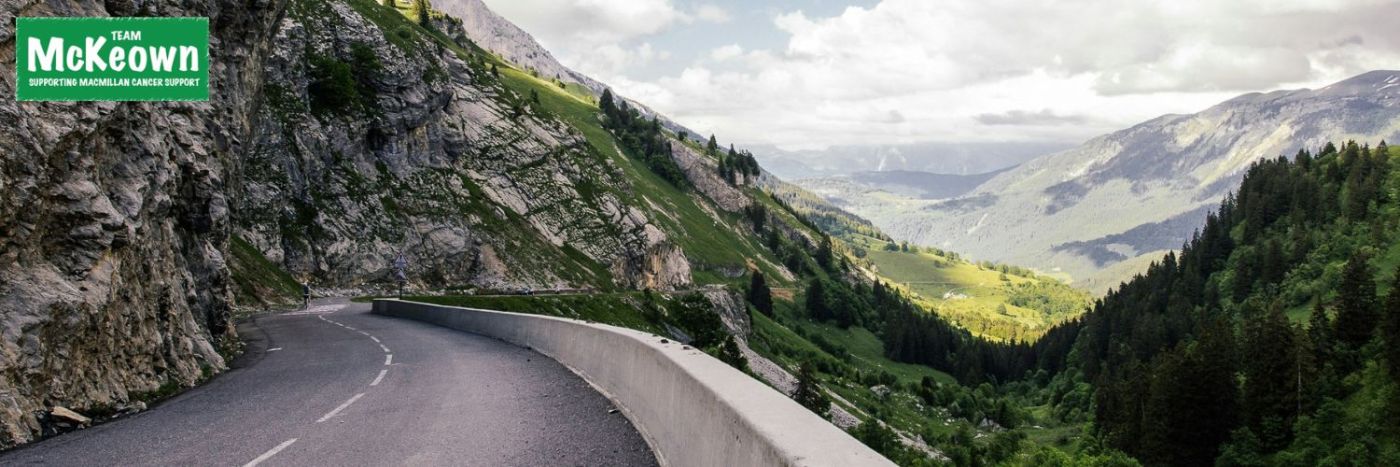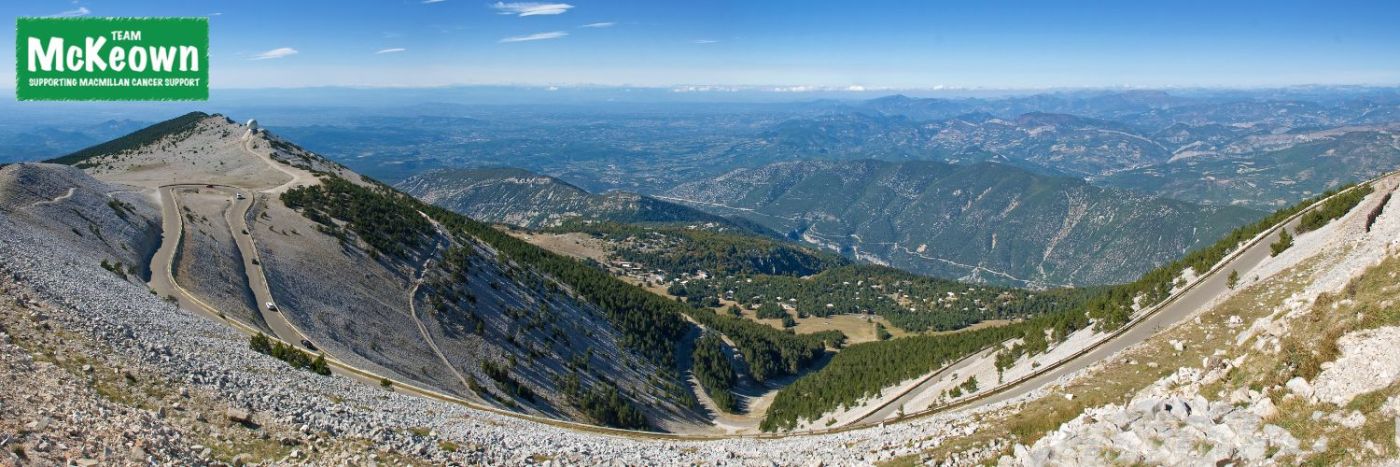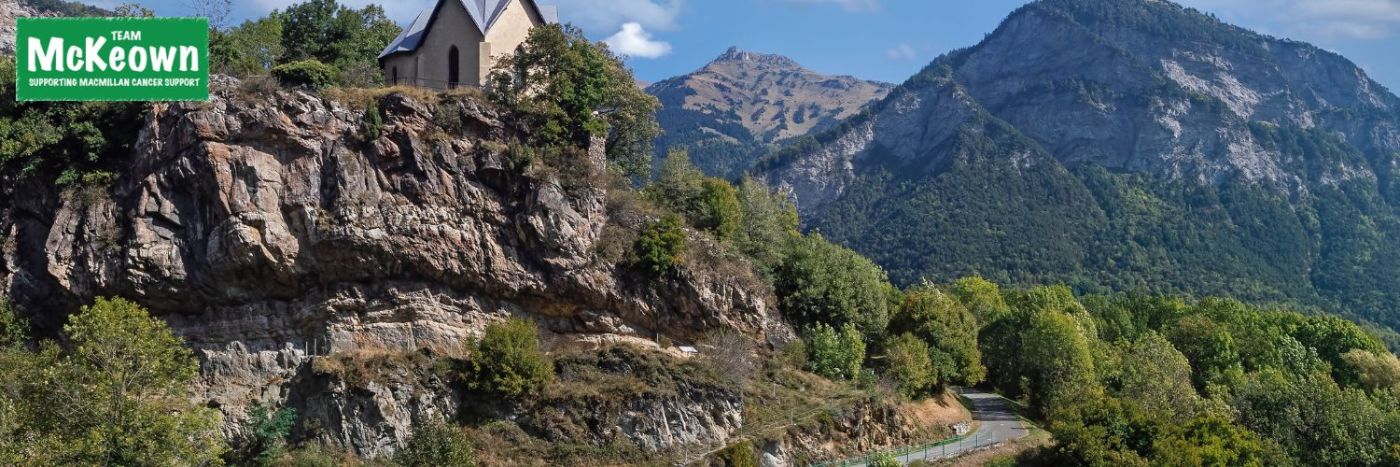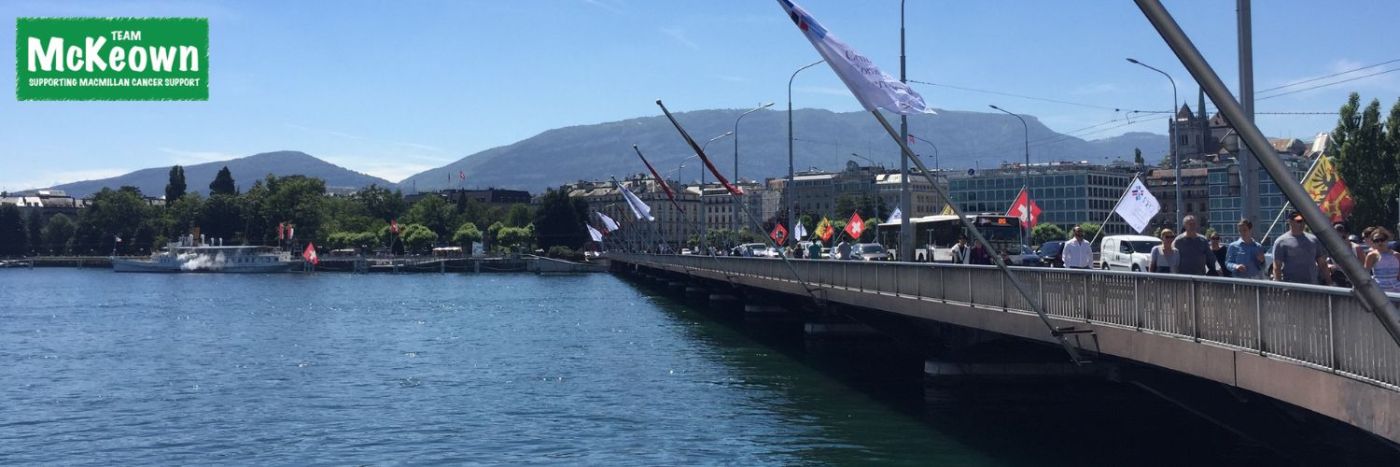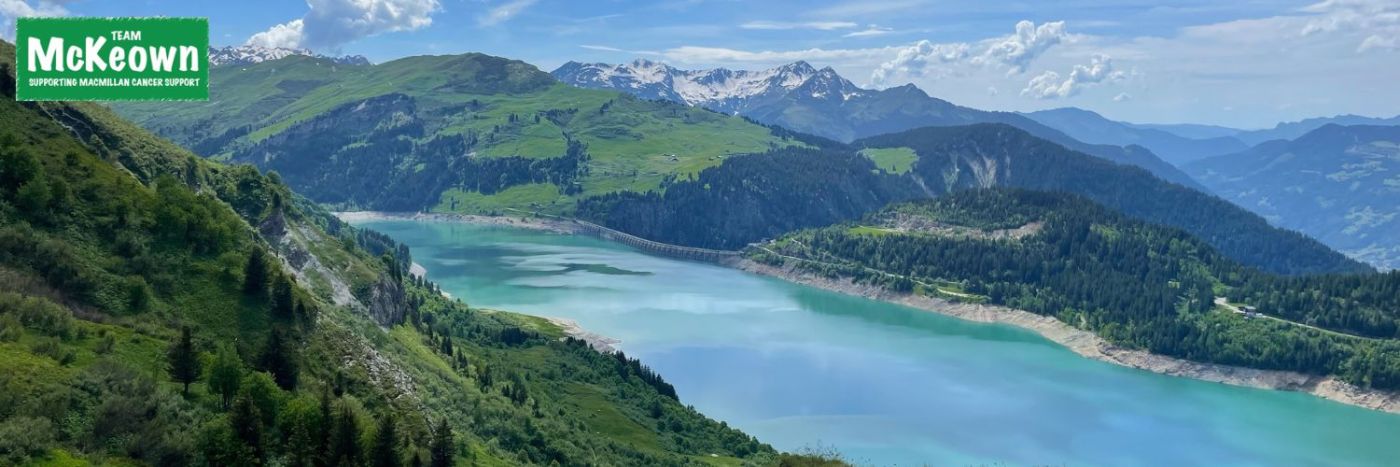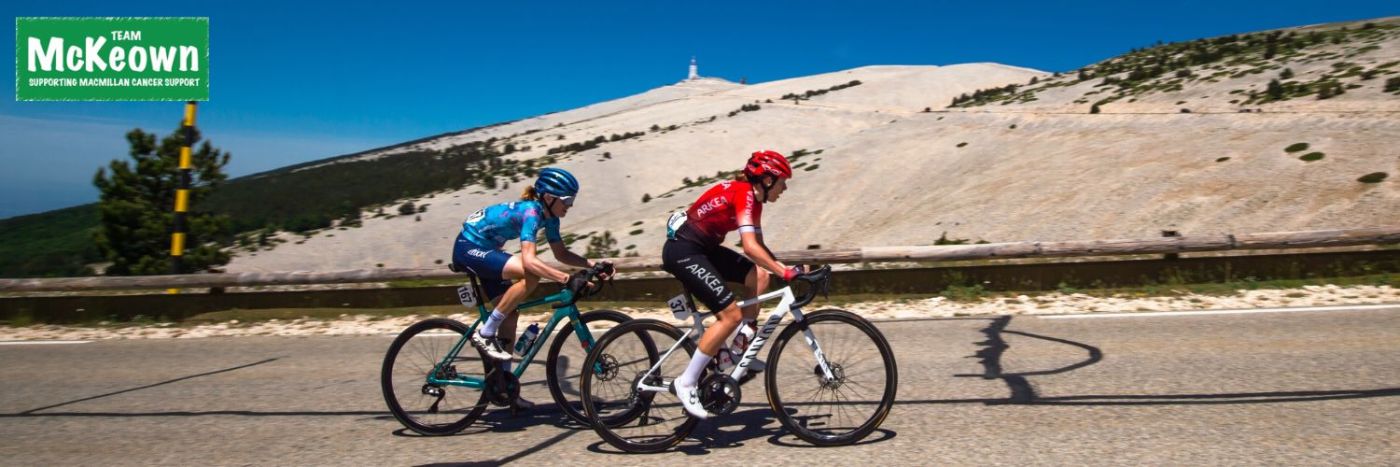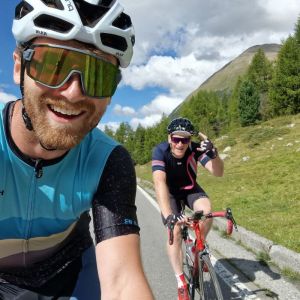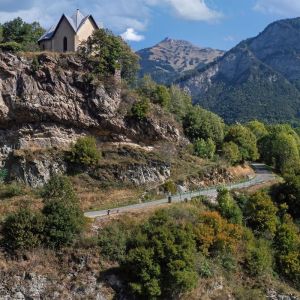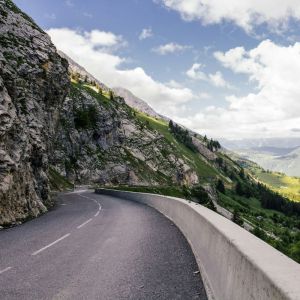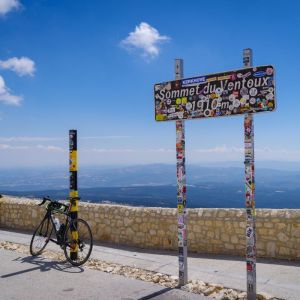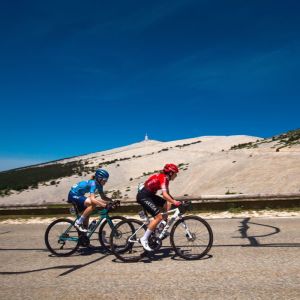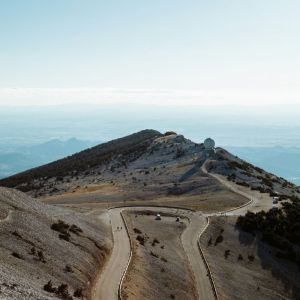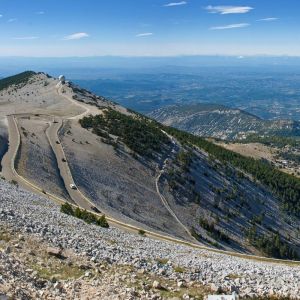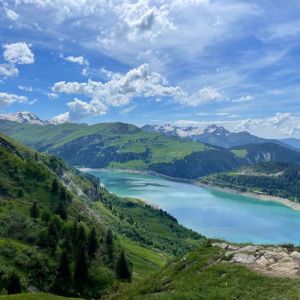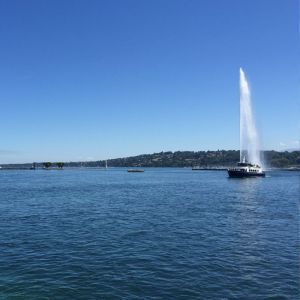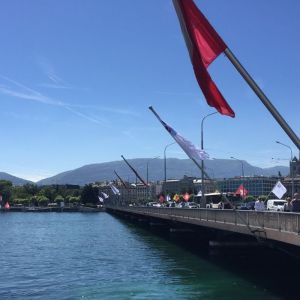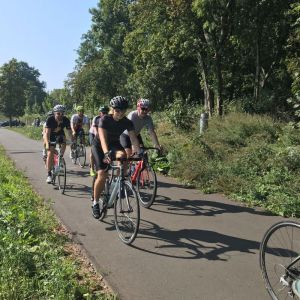- Overview
- Map & Itinerary
- Essential Info
- Pics & Vids
- Dates & Prices
Highlights
- Private cycling challenge for Team McKeown in support of Macmillan Cancer Support
- Cycle from the shores of Lake Geneva to the stunning coastline of Nice through the breathtaking French Alps
- Conquer the legendary “Giant of Provence” Mont Ventoux, a famed highlight of the Tour de France
- Experience the famous ascents of Col de la Colombière, Col du Galibier, and Col d’Izoard
- Ride through a landscape of majestic peaks, limestone cliffs, lavender fields, and dramatic gorges
- Pedal over 950kms in support of Macmillan Cancer Support on this challenging and unforgettable journey.
Overview
The Geneva to Nice Mont Ventoux Route is an epic 8-day cycling adventure that begins on the shores of Lake Geneva and winds through the French Alps, finishing at the sun-soaked beaches of Nice. Unlike the traditional Route des Grandes Alpes, this route gives riders the thrilling chance to tackle the legendary Mont Ventoux, known as the “Giant of Provence,” a highlight in Tour de France history.
Over 7 days of cycling, you’ll experience breathtaking scenery, from towering mountain peaks and majestic gorges to picturesque lavender fields and limestone cliffs. This challenging journey includes iconic Tour de France climbs like Col de la Colombière, Col des Aravis, Cormet de Roselend, Col du Télégraphe, Col du Galibier, Col d’Izoard, and the mythical Mont Ventoux.
Covering 950km, with 17 major climbs and over 19,000m of elevation gain, this demanding ride promises an unforgettable cycling experience through some of the most spectacular landscapes in France. All in support of Macmillan Cancer Support, this ride with Team McKeown is sure to be both rewarding and awe-inspiring.
This challenge is fully supported thanks to the presence of the support vehicle, bike mechanic and your cycle leaders throughout.
Travel to Geneva Airport and to your hotel
Please make your own travel arrangements. There are direct flights available from Edinburgh Airport to Geneva Airport (GVA) or flights from Glasgow Airport with one stopover to Geneva Airport (GVA). Then make your way to your hotel in Geneva. Details will be provided.
On arriving at the hotel, you will rendevouz with your bike for assembly and preparation for the start of your challenge the following day.
Time permitting, you are welcome to test your bike with a short ride in Geneva or explore Switzerland’s second-largest city by foot.
A full trip briefing will be provided over dinner at the hotel.
Included
Accommodation: Hotel (twin share basis)
Meals: Dinner
Geneva to Megeve
Following breakfast your first day of riding begins on the picturesque shores of Lake Geneva, before you head out of Switzerland and into France. The first 50km includes some gentle climbs, offering a perfect warm-up for the day’s main challenge – the Col de la Colombière. This Category 1 climb is 16.6km long, reaching a summit of 1613m, with an average gradient of 6.8% and a max of 12%. The first 6km, up to the village of Le Reposoir, are relatively easy, allowing you to find your rhythm. Beyond the village, the climb intensifies, with gradients consistently between 9% and 11%.
The descent from Col de la Colombière is enjoyable, though there are a few wide hairpin bends near Le Grand Bornand where caution is advised. After reaching Le Grand Bornand, you’ll have a short ride to the village of Le Clusaz, where the second climb of the day begins – the Col des Aravis. This climb is 8km long, with gradients of 5% to 7%, and a summit of 1487m, offering spectacular views of the Aravis range and Mont Blanc as you ascend.
The descent down Col des Aravis is more technical, with narrow sections and sharp turns, so take it easy as you twist and turn down to the village of Flumet. From there, it’s a 10km ride to your overnight stay in the charming town of Megève.
Distance: 107km
Ascent: 2331m
Climbs: Col de la Colombiere, Col des Aravis
Included
Accommodation: Hotel (twin share basis)
Meals: Breakfast, lunch and dinner
Checkpoint snacks & water refills
Megeve to Les Allues
With your legs warmed up from a first day in the saddle yesterday, your day begins with a steady descent, leading you to the first climb, the Col des Saisies. This 15km climb features an average gradient of 5% and peaks at 1657m. You’ll start with a series of switchbacks winding through alpine forests, which then open up to reveal stunning meadows and charming alpine villages.
After descending the Col des Saisies, you’ll follow a picturesque valley road to the beautiful village of Beaufort, with breathtaking views of distant mountain peaks along the way. After a well-deserved coffee stop, you’ll tackle the second climb, Cormet de Roselend – a 20.3km ascent with an average gradient of 6% and a summit at 1967m. The climb begins with straight sections and leads into dramatic switchbacks, eventually revealing the stunning turquoise waters of Lac de Roselend.
The road around the lake offers a gentle descent and plenty of opportunities for photos. As you pass an old chapel and begin the climb’s most spectacular stretch, you’ll rise above the lake and enter more rugged terrain for the final 4km. After reaching the summit, the descent to Bourg St Maurice is steep and twisty, requiring extra care. From there, you’ll descend further to Moutiers, before finishing the day with a climb up the first 6km of the Col de la Loze, arriving at your overnight stop in the traditional French village of Les Allues.
Distance: 120km
Ascent: 3203m
Climbs: Col des Saisies, Cormet de Roselend, Col de la Loze
Included
Accommodation: Hotel (twin share basis)
Meals: Breakfast, lunch and dinner
Checkpoint snacks & water refills
Les Allues to Valloire
Your third day on the road begins with a smooth descent to Moutiers, before heading onto quiet backroads towards Fession-Sur-Isere and the first major challenge of the day – the Col de la Madeleine. This is no easy feat, with a 26km climb and an average gradient of 5.4%, ramping up to a steep 12.5% near the 2000m summit. The Col de la Madeleine, featured in 22 editions of the Tour de France, starts with hairpin bends through a forest and opens up to reveal stunning waterfalls and towering mountain peaks.
At the summit, you’ll be rewarded with breathtaking views of the Maurienne Valley and other legendary climbs, like Col du Glandon, Col de la Croix de Fer, and Mont Blanc. After enjoying a coffee and some famous salty chips, you’ll descend towards La Chambre. This descent is fast, with over 40 bends, so take caution as you navigate the twists and turns.
From La Chambre, you’ll ride a pleasant 6km flat section before tackling the Lacets de Montvernier. This short but iconic climb, which appeared in the 2015 Tour de France, features 17 hairpin bends in just 2.5km, with an average gradient of 8%. After descending back into the valley, you’ll head to St Michel de Maurienne, where the road gradually climbs before leading you to the Col du Télégraphe. This 12km climb, with an average gradient of 7.3% and a summit at 1566m, offers beautiful wooded surroundings and protection from the elements. After reaching the top, you’ll enjoy a short descent into Valloire for your overnight stay.
Distance: 114km
Ascent: 3271m
Climbs: Col de la Madeleine, Lacets de Montvernier, Col du Telegraphe
Included
Accommodation: Hotel (twin share basis)
Meals: breakfast, lunch and dinner
Checkpoint snacks & water refills
Valloire to Gap
Today takes you from the Central French Alps into the stunning Southern French Alps, tackling two iconic climbs along the way. First up is the legendary Col du Galibier, one of the most celebrated climbs in Tour de France history. Starting from Valloire, the climb stretches 18km with an average gradient of 7%, reaching a maximum of 11%, and topping out at 2646 metres. The initial kilometre is tough, but it eases into a “false flat” section before the gradient gradually increases all the way to the summit. Though challenging, the views from the top make it all worthwhile.
The descent is fast and exposed, with a bumpy road surface in places, so caution is key. After 10km, you’ll reach the junction at the Col du Lautaret, where, on a clear day, you can enjoy breathtaking views of the Massif des Ecrins glaciers. From there, you’ll continue a 28km descent to Briançon, the highest town in France at 1326 metres.
Next, you’ll take on the Col d’Izoard, starting right from the centre of Briançon. This climb is 19km long, with an average gradient of 5.8%, maxing out at 9%, and a summit of 2360 metres. The stunning scenery, with barren scree slopes that can change colour from pink to yellow throughout the day, makes this one of the most scenic climbs of the trip. After reaching the summit, you can enjoy a thrilling 45km descent to Embrun, located on the shores of Lake Serre Ponçon, the third-largest artificial lake in France. From there, it’s 40km of undulating road to your hotel in the town of Gap.
Distance: 166km
Ascent: 3115m
Climbs: Col du Galibier, Col d’Izoard
Included
Accommodation: Hotel (twin share basis)
Meals: Breakfast, lunch and dinner
Checkpoint snacks & water refills.
Gap to Sault
Today’s a big yet iconic day in the saddle. With the towering peaks of the French Alps behind you, today takes you toward the vibrant lavender fields of Provence. Leaving the “Route des Grandes Alpes,” you’ll have the opportunity to tackle another iconic climb – the “Giant of Provence,” Mont Ventoux. At 21km long, with an average gradient of 7.2% and a summit height of 1912m, this climb is a dream for most cyclists.
You’ll take on Mont Ventoux from the Malaucène side. The first 2km are steep, with gradients averaging 9%, followed by a more manageable section with gradients around 4-6% up to the 9km marker. From there, the climb becomes more challenging, with gradients reaching over 10%, and even 12% in some spots. The road twists and turns, eventually leading you out of the treeline, where you’ll catch your first glimpse of the iconic red and white broadcasting tower – still 250m above you. The final hairpins are steep, but reward you with breathtaking views, and on a clear day, you can even see the Alps.
The descent to your overnight stay in Sault is fast and technical in parts. After 4km, you’ll pass the “Tommy Simpson” Memorial, and 2km further down, you’ll reach Chalet Reynard and the turn-off for Sault. The road then winds through a forest before opening out to reveal the stunning lavender fields. A short climb brings you to the beautiful town of Sault, where you’ll overnight.
Distance: 176km
Ascent: 2453m
Climbs: Col de la Saulce, Mont Ventoux
Included
Accommodation: Hotel (twin share basis)
Meals: Breakfast only
Checkpoint snacks & water refills.
Sault to Dignes-les-Bains
After two challenging days in the saddle, today offers a shorter and more manageable ride. From Sault, you’ll enjoy a relatively flat 5km before reaching the start of the Col de l’Homme Mort (Dead Man Pass). Despite its ominous name, this 8.4km climb is quite gentle, with an average gradient of 4.2% and a maximum of 7%, and you’ll be at the summit before you know it.
The descent down the other side of the Col de l’Homme Mort is on a narrow, winding road, so take it easy and soak in the stunning views.
Once you reach the main road, you’ll face another gradual climb – just over 3km to the top of Col de la Piguière. After this short ascent, you’ll enjoy a long stretch of mostly downhill road for 55km, followed by a gentle 7km climb into the town of Digne-Les-Bains, where you’ll overnight.
Distance: 91km
Ascent: 837m
Climbs: Col de l’Homme Mort, Col de la Piguiere
Included
Accommodation: Hotel (twin share basis)
Meals: Breakfast only
Checkpoint snacks & water refills.
Dignes-les-Bains to Nice
Your final day of riding takes you along an undulating route to the stunning finish in Nice. The day starts with some flat roads leading into the heart of Digne-Les-Bains before tackling the first climb, Col du Corbin. This climb is actually two-in-one: the first 6.4km is Col de Pierre Basse with a moderate average gradient of 4.2% and a max of 8%, followed by the 4.6km ascent to Col du Corbin. The road winds through forests, opening out at the summit with spectacular views of the surrounding landscape.
Take care on the descent, as the road surface can be rough in places. After navigating a few smaller climbs, you’ll arrive at the charming market town of Castellane on the banks of the Verdon River. The scenery here is breathtaking, with towering rock formations and deep blue rivers providing a perfect backdrop to your ride.
After lunch, you’ll head toward the highest point of the day – the medieval village of Gréolières. Perched on a ridge against the southern slopes of the Chérion mountain, this village is rich in history, with its ruined castle and ancient chapels making for a picturesque stop.
From here, it’s a 40km descent into Nice, passing through the famous Gorge du Loup. The road is carved into the rock, with short tunnels, hairpin bends, and stunning waterfalls along the way. Your epic journey concludes with a flat ride along the iconic Promenade des Anglais, where the sight of the Mediterranean Sea marks the end of your epic adventure on two wheels for Macmillan Cancer Support.
Distance: 147km
Ascent: 2019m
Climbs:Col de Pierre Basse, Col du Corobin, Col des Leques, Col de la Colle
Included
Accommodation: Hotel (twin share basis)
Meals: Breakfast only
Checkpoint snacks & water refills.
Return home from Nice Airport
Following a leisurely breakfast it’s time to make your way home filled with a huge sense of achievement.
Please make your own way to Nice Côte d’Azur Airport for your return journey home.
Included
Meals: Breakfast only
Please note that the itinerary is subject to change based on road closures, weather conditions, or unforeseen circumstances. Adjustments may also be made following the completion of our recce to ensure the best possible experience for all participants. Your safety and enjoyment remain our top priorities, and we appreciate your understanding.
On booking the Geneva to Nice Cycling Challenge, you’ll receive the recommended flight details plus all the exciting trip info via our free mobile travel app. You’ll have access to your itinerary, training guide, countdowns, live updates, contact info, weather forecasts, kit lists and much more at the touch of a button 24/7 via your mobile phone. No more unnecessary use of reams of paper and the need of carrying around documents with you. The app is free to download and all info is customary to your cycling trip ahead. A’ppy days.
With being a small family business we pride ourselves with providing personal, professional and friendly service for your Geneva to Nice Cycling Challenge. We’re here to help you every step of the way from the moment you join the team all the way through to completing the challenge and beyond.
Flights
Flights to Genève Aéroport and from Nice Côte d’Azur Airport are not included. Direct flights to Geneva and from Nice are available from Edinburgh. Once you’ve booked, we’ll provide you with flight details.
Transfers to and from Geneva and Nice Airports
You are responsible for arranging your own transfers to and from the airports in Geneva and Nice. If needed, we can offer travel recommendations to assist with your planning.
Travel Insurance
Travel Insurance is an important part of any booking. It is compulsory that everyone who travels with us has taken out adequate travel insurance which includes, among other things, cover for the full value of your trip, medical (emergency, evacuation and repatriation) arrangements, personal liability, cancellation, curtailment and loss of luggage, flight delays and personal effects and pandemic travel cover.
For UK residents we have partnered with Campbell & Irvine Direct to provide you with a travel insurance. If you would like to obtain cover for your trip please feel free to contact specialist Insurance Brokers, Campbell Irvine Direct for a quote.
Bicycle Insurance
We strongly recommend that you obtain suitable bicycle insurance to cover your bike and equipment during transportation and on the cycling challenge itself. Please feel free to shop around or obtain a direct quote from Cycle Guard or Bikmo.
All nationalities require a full passport. For the latest information, please refer to the links below:
Switzerland and France follows Schengen area rules. Your passport must:
- have a ‘date of issue’ less than 10 years before the date you arrive – if you renewed your passport before 1 October 2018, it may have a date of issue that is more than 10 years ago
- have an ‘expiry date’ at least 3 months after the day you plan to leave the Schengen area.
British nationals do not require a visa to enter Switzerland or France for the purpose of tourism for up to 90 days.
You can travel without a visa to the Schengen area, which includes Switzerland and France, for up to 90 days in any 180-day period. This applies if you travel:
- as a tourist
- to visit family or friends
- to attend business meetings, cultural or sports events
- for short-term studies or training
For the latest entry requirements, please visit the F&CO website and also check Brexit advice for travelling to Europe.
Adventurous Ewe puts the safety and well-being of you, our leaders & crew and the communities we visit at the centre of all our operations, always. Your safety and well-being is our top priority. The Geneva to Nice Cycling Challenge is designed to take you out of your every-day comfort zone and achieve something great with undertaking this self-powered journey. Rest assured we have a thorough Safety Management System, indepth risk assessments and risk management systems in place. Your crew will be equipped with communication devices (eg phones and radios) and medical kit.
Here are a couple of important points for your consideration:
- Be prepared. The terrain on the challenge is often undulating, with some big hill climbs, so
- please be prepared for some long and tough days consecutively in the saddle.
- Pack for all weather. The weather during the challenge can be unpredictable so we would recommend checking the weather forecast beforehand and pack the appropriate clothing.
- Familiarise yourself with the cycling code and regulations for both Switzerland and France before you go. Please note that new cycling rules were introduced in Switzerland as of 1 April 2024.
- Debris on the roads. The roads in the high mountains take an absolute battering. They’re covered with snow for much of the year and the freeze-thaw process takes it toll. Rain washes gravel into the roads. Rockfalls mean you can come across large chunks of rock in the road! Remember this and do take care, especially on the downhills.
- Review the route. You’ll receive a GPX file of your cycling route prior to your departure. Spend some time getting to know the route. It’s important to know what to expect before you set out. Consider how long each climb should take, where you plan to refuel (outside of any dedicated water-stops) and take note of any important sections. You never know what’s going to happen out on the road, so it’s good to be self-reliant.
- Lights, phone, ID and money/cards. Keep a small rear light fitted to your bike in case you come across a tunnel or get caught in bad weather. You may want a front light too for added safety. And make sure you have money/cards, ID and your phone on you at all times!
- Remember it’s a marathon not a sprint! At the beginning of a day/week of cycling, it can be easy to spin off quickly at a pace you can’t sustain. Italy’s mountains are some of the toughest cycling climbs in the world – take it easy and try and remember it’s a team challenge so look out for one another!
- Long days in the saddle. 8+hours of cycling each day is long time to spend in the saddle, so please ensure your prepare accordingly and that you fuel your body correctly at the water stops and during breakfast and lunch.
We strongly recommend that you have your bike serviced to guarantee it is in perfect working order before your cycling challenge. If you are not mechanically minded, get your local bike shop to service it for you such as Chapeau Cycles. Areas of particular importance are:
1. To begin with check our rims and if they are worn, cracked, or badly dented replace them with new rims or a complete wheel.
2: Check and if required replace brake blocks.
3: Check that your wheels are “true” and spoke tension is correct.
4: Check and if required, adjust, grease, or replace ALL bearings and quick release skewers.
5: Check and if required replace brake and gear cables.
6: Check and if required tighten all bolts (esp. crank, bottom bracket, headset, stem, and handlebars.
7. Finally, check the chain, cassette, and chainrings for wear.
You should familiarise yourself with some basic repairs before your cycling challenge, like changing an inner tube and fixing a puncher. A member of our team will always be on hand to help, but having these basic skills will help keep delays down to a minimum.
You will be accompanied by certified Adventurous Ewe Cycling Leader/s, Bike Mechanics and Crew. Our Leaders are first aid qualified and have extensive experience in leading cycling trips. They will be ultimately responsible for the running of the itinerary and the safety of your group.
Leaders and Crew will carrying full safety equipment and first aid kits with larger first aid kits located in the support vehicle. Please note, these kits are for emergencies only so please come prepared with your own personal first aid items. The Leaders and Crew will also be in constant radio communication with the vehicle drivers throughout your adventure.
The crew will be looking after every aspect of your trip with transporting your luggage, helping you with GPX route files, a friendly & supportive face at checkpoints and sorting out any mechanical problems. Support vehicle will be at the checkpoints and there will be a cycling leader accompanying the team during the ride.
The Geneva to Nice Cycling Challenge is a team adventure and not designed to be an individual competitive race. The route will be supplied as a GPX file and therefore there will be no route marking by way of directional arrows (helping us to reduce our carbon footprint).
There will be two Cycling Leaders accompanying the group. There will be a support vehicle available which you will see at each checkpoiint and lunch stop plus it is available for any emergencies. We encourage team spirit and support of each other to ensure everyone has the best opportunity to complete the challenge and enjoy the journey along the way too.
All luggage and bike spares will be carried in the support vehicle. Please ensure you carry your own puncture repair kit and spare inner tubes.
The Geneva to Nice Cycling Challenge is graded as Tough. It is a strenuous challenge which will allow people to push themselves out of their comfort zone with considerable hill climbs and descents and long days in the saddle.
For logistical and safety reasons we sometimes need to re-group, so the front-cyclists may find themselves waiting for the slower ones. Please relax, and remember that this is a team effort that enables people to achieve their personal goals.
We highly recommend that all participants on this trip are able to meet the following:
- Cycle at least 100 miles per day at an average pace of 20km per hour, over an undulating route. Failure to do so may result in receiving significantly less support from the Cycling Leaders
- Completed previous multi-day cycle trips
- Confidently and efficiently fix a puncture by replacing the inner tube
- Confidently navigate whilst riding using a Garmin or mobile phone app
- Ridden a Category 1 or HC (Hors catégorie) climb before and have the right gear set up for this – note, this may mean having a climbing cassette fitted to your bike
- Must be able to carry adequate clothing to cope with mountainous weather – jacket, arm and leg warmers, gloves and under hat, water, electrolytes and nutritional fuel
- Must be able to confidently descend using drop handlebars or have your bike set up with secondary brakes.
A full kit list will be provided when you join the team for the Geneva to Nice Cycling Challenge. Good kit can make the difference between a fantastic two-wheeled and an uncomfortable one.
We strongly recommend that the bike is serviced the week before your challenge to ensure that the brake and gear cables along with brake pads haven’t been to worn out during your pre-challenge training.
Whilst we plan our trips around the optimal weather conditions, you could still be exposed to wet & windy or hot & humind weather at any time. It is important that you are prepared for all conditions.
Despite this trip being held at the start of Autumn, the weather can change rapidly in the mountains so it is essential that you are prepared for all conditions including rain, wind and heat. In the week leading up to your trip we recommend monitoring the weather forecast and you will also receive weather updates via our mobile travel app, Vamoos.
Pack for all weather. At any time of year, take a jacket on your ride. It might feel over-cautious when it’s sunny and warm as you set out, but you’ll be grateful at the top of the pass.
If the forecast suggests poor weather, you’ll need to pack kit in addition to a jacket: arm and leg warmers and long-fingered gloves, possibly overshoes too.
Heatstroke. Use sun cream and drink plenty of water. One great thing about riding in Italy is that there are generally a fair few water fountains around. However it’s still important to carry plenty of water and remember to drink it. Heatstroke can strike quickly and is very unpleasant and can be very serious. Try to rest in the shade wherever possible.
Cramp. This is a common complaint and is often due to the fact you’re sweating and not replacing the electrolytes. Ensure you take electrolyte tablets for your water bottle and use them to help stave off cramps.
Please note, the Leader/s reserve the right to change the itinerary at any time should the conditions require it as your safety and wellbeing is our top priority at all times. In these circumstances we will make the best alternative arrangements possible that maintain the integrity of the original itinerary.
We have aimed to stay in 3* star hotels or above on this challenge. Standards may vary between the hotels but they are generally comfortable and convenient for your route. Most night’s accommodation is on a half board basis (dinner, bed & breakfast included).
Rooms will be used on a twin share basis & all rooms will have their own bathroom.
All meals outlined in your itinerary are included.
Breakfast is typically a continental-style breakfast. Lunches will either be picnic-style or in a local cafe, while dinners will be enjoyed at your hotel or a nearby restaurant.
Water and snacks will be available at checkpoints along your cycling route. It’s important to eat enough to maintain your energy levels throughout the challenge. We highly recommend bringing your own high-energy snacks and electrolytes that your body is accustomed to, ensuring you’re properly fuelled for this demanding journey.
If you have any dietary requirements or allergies, please inform us during the booking process or through the link we’ll provide.
Deposit: £395 per person is required on booking and is non-refundable.
Sponsorship pledge: £4,600 per person for Macmillan Cancer Support. This money is to be sent directly to Macmillan. 80% of your sponsorship (£3680) must be received by Macmillan no later than 5 weeks prior to departure. The remaining 20% (£920) must be received by Macmillan no later than 4 weeks of the completion of your challenge. On receipt of this sponsorship, Macmillan will then pay your trip balance of £2,300 per person. This also includes the Team McKeown drivers accommodation and meals during the trip.
Your details will be shared with Macmillan Cancer Support who will provide you with plenty of fundraising support, tips and advice. Should you have any questions regarding your fundraising, please contact Amy Clark at AClark@macmillan.org.uk.
We’ve got you covered – financial protection
If your adventure needs to be cancelled for any reason, like say a global pandemic, you won’t be left stuck and you’ll be offered plenty of alternative options thanks to our financial protection arranged by IPP .
| Departure & Return | Duration | Availability | Deposit | Total Cost* | (*Total cost includes the deposit) |
| Sep 19, 2025 Sep 27, 2025 |
9 Days | Guaranteed to run | £395.00 | £395.00 | Book Now |
What's Included?
Pre-trip:
- Personalised trip support
- Trip reconnaissance
- GPX file of the route
- Cycle training programme
- Discount on personal kit both in shop and online
- Trip info supplied via mobile travel app
- Public liability insurance
- Risk assessment and emergency management planning.
During your trip:
- Cycle leaders, support crew and bike mechanic
- Support vehicle and luggage transfers
- 8 nights accommodation (twin share basis)
- Meals per your itinerary
- Snacks and water station checkpoints
- Full back-up support including first-aid qualified crew and first-aid supplies
- Carnet for the import and export of your bicycles into the EU
- Accommodation and meals for Team McKeown support drivers
- All challenge management before, during and post trip.
What's Not Included?
- Bike insurance
- Travel insurance
- Visa (if required)
- Vaccinations (if required)
- Any pandemic tests required for entry to any countries or places of interest on your challenge itinerary
- Bike and helmet – each participant must bring their own recently serviced bicycle and a helmet must be worn at all times whilst on your bike
- Clothing and equipment listed on your Kit List
- Getting to the start and from the finish of the trip
- Personal snacks and electrolytes
- Any costs incurred with leaving the trip early, ie. accommodation, travel, etc.
- Personal spending money.
THOUGHTFUL AND RESPONSIBLE TRAVEL
Adventurous Ewe is committed to delivering our trips in a responsible and ethical manner. We respect and aim to operate our adventures to benefit local people, their economy and the environment!
Plus, our commitment to support of our environmental charity partner, Cool Earth, means you can rest assured knowing you’re taking on this challenge in a meaningful way.
Some of the ethical features embedded in this Geneva to Nice Cycling Challenge are:
- Staying in smaller-scale locally owned accommodation
- Buying locally produced food and drink, and dining in locally owned restaurants
- Minimising plastic waste wherever possible
- Offering real life experiences which promote cross-cultural understanding
- Operating with a ‘leave no trace’ ethos – take only memories, leave only footprints
- Adventurous Ewe will make a financial contribution to the environmental charity, Cool Earth, as part of our business partnership.
As Sir David Attenborough said:
“Helping Cool Earth to halt tropical deforestation makes a real difference. Perhaps the biggest difference we will make in our whole lives.”
We will continue to invest a % of our revenue into supporting critical conservation projects around the world through Cool Earth and we invite you, our valuable flock, to do the same. Please give what you can and help save the world’s rainforests today by simply clicking here. Just £2.50 will save 10 trees and lock up 10 tonnes of CO2.
Together, we can all make a difference in helping preserve this precious and wonderful planet.
 Difficulty
Difficulty
